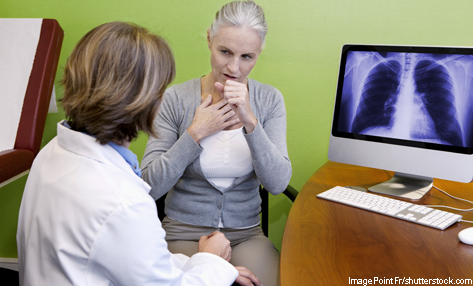The partners involved in the project want to develop a handy test device that enables patient-centered rapid diagnostics. The technological basis for this is a direct diagnosis of pathogens that is largely independent of cultivation. The collection and processing of samples such as urine, blood or samples from the lungs are simplified and miniaturised. To determine the pathogen or the host response, new methods for duplication of the genetic material are researched and direct light-based methods such as microscopy or spectroscopy are further developed.
Lung and respiratory diseases are among the world's ten leading causes of death. The cost of respiratory diseases in this country adds up to 5.1 percent of the health budget (around twelve billion euro). In people with weakened immune systems, pneumonia can be caused by a variety of pathogens which are difficult to detect in some cases and are not always addressed by standard antibiotics. These pathogens also have increasing resistance to antibiotics, which make them difficult or even impossible to treat. "Especially for these patients, timely pathogen-specific diagnosis and early and targeted therapy can be lifesaving because the body's defense mechanisms do not work," explains Prof. Dr. Mathias Pletz, Director of the Centre for Infectious Diseases and Hospital Hygiene at the University Hospital Jena and medical coordinator of the project. Currently, the identification of the pathogen takes a long time and is very stressful for the patient: The lung is flushed during an elaborate examination in order to detect the pathogens in the rinse fluid.
The project is an association between five universities and research institutions as well as two companies, all of which are partners of InfectoGnostics Research Campus Jena. The subprojects progress along the innovation chain from determining medical need and developing new technologies to preparing samples and producing prototypes and new tests. "The project for the development of innovative diagnostic technologies in Jena will receive 10 million euro from the BMBF program Research Campus in the next five years," said Prof. Dr. Jürgen Popp, overall coordinator of the project as well as Board Chairman and spokesperson for InfectoGnostics. "The growing threat of resistant germs requires a concentrated effort. The project is providing the framework for this,” said CEO Klaus Schindlbeck from Alere Technologies GmbH in praise of the project. Alexander Berka, director of the Life Science department at Analytik Jena AG, adds: "This project is an important stimulus for cooperation between science and industry at the Jena site." Both industry partners are investing more than 4 million euro in the project. Through the BMBF’s launch of the main phase of the research campus, the project was able to begin work on February 1. "I am delighted that we can now pursue the interdisciplinary approach of the research campus in our key project," says Professor Popp.
Participating partners
• Alere Technologies GmbH
• Analytik Jena AG
• University Hospital Jena (UKJ)
• Leibniz Institute of Photonic Technology (IPHT)
• Leibniz Institute for Infection Biology and Natural Products Research - Hans Knöll Institute (HKI)
• Friedrich Schiller University Jena
• Ernst Abbe University of Applied Sciences (EAH) Jena
InfectoGnostics – Jena Research Campus
The InfectoGnostics research campus is a public-private partnership developing new methods in the diagnosis of infections and pathogens, e.g. viruses, bacteria and fungi. InfectoGnostics is funded by the BMBF in association with the funding initiative “Research Campus - Public-Private Partnership for Innovation” with additional support from the State of Thuringia. About half of the required budget is financed by the participating partners.
Researchers at the InfectoGnostics research campus are developing on-site test methods for lung infections
